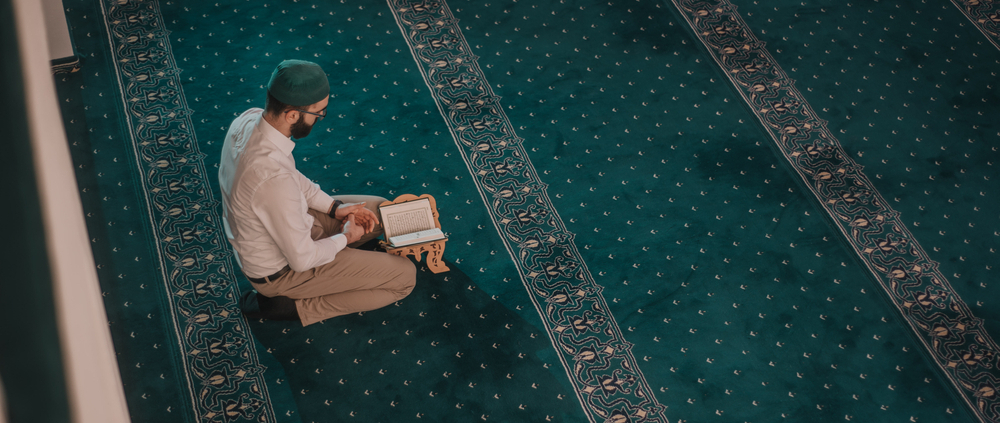How Do I Dedicate My Entire Life to Allah?
Answered by Shaykh Abdullah Anik Misra
Question
I’m 37, male, married with two kids. For the last 1.5 years, I’ve got a deep urge to dedicate my entire life to Allah. However, there is fear that’s not making me take the step. I’m financially okay, and insha’Allah, Allah will keep increasing my rizq in this world too.
What do I do to take the next step? I don’t want to look back at my life and say I wasted my time waiting for the “right” moment.
Answer
In the Name of Allah, Most Merciful and Compassionate
This is indeed a noble aim. If you want to dedicate your life to Allah, I would suggest that you strive to:
- Be the best possible husband and father you can be, fulfilling all rights and showing the best character and service to your family. Be present and attentive around the house.
The Prophet (Allah bless him and give him peace) said, “The best of you are those who are best to their family.” [Tirmidhi] - Invest yourself in spending quality time with your children and raising them with total dedication to their holistic upbringing, collaborating with your wife.
The Prophet (Allah bless him and give him peace) said, “Each of you is a shepherd, and each of you will be questioned regarding his flock. (…) A man is responsible for the inhabitants of his house, and he will be questioned about them (…)” [Bukhari] - Continue working and earning money for the sake of Allah to the extent that your family is comfortable since everything you spend on your family is a charity and supporting them in every way is a religious obligation on you. If you do not need to earn a livelihood, seek further advice on creating a roadmap for yourself while balancing your interests and responsibilities.
The Prophet (Allah bless him and give him peace) said, “If a Muslim spends on his family seeking reward from Allah, it is charity for him.” [Bukhari] - Cover the bases of your obligatory prayers, fasts and charities, and strive to fulfill the Sunnas as much as possible with excellence. Worship Allah more in your free time, after paying due attention to your family or fulfilling other obligations. Leave your major devotion to when they are asleep or occupied and not needing your attention.
- Seek knowledge when you can in a balanced and moderate way in your free time to increase in understanding, and possibly engage in a gathering of remembrance weekly to boost your spiritual state and encourage being in religious company.
- Serve those around you who need you, such as your parents, relatives, community members, and neighbors, when and as you can.
- Strive to purify your heart, replace ignoble traits and habits and replace them with noble ones, and improve your character, especially in your dealings with others.
The Prophet (Allah bless him and give him peace) said, “Nothing is heavier upon the scale of a believer on the Day of Resurrection than his good character. Verily, Allah hates the vulgar and obscene.” [Tirmidhi] - See what types of worship Allah has made you good at, whether Quran reading, or prayers, or service to others, and make a schedule for yourself to perform them gradually but consistently. Emphasize quality (presence of heart) over mere quantity, and do not try to rush or do too much too soon.
The Prophet (Allah bless him and give him peace) said, “Take up good deeds only as much as you are able, for the best deeds are those done regularly even if they are few.” [Ibn Majah]
If you do all of the above for Allah’s sake and pleasure, even if you end up doing only a few extra devotional works to Allah after your obligatory acts and life commitments, you will have spent your life dedicated to Allah, and you will not regret that one bit.
In other words, you can dedicate your life to Allah without leaving your responsibilities, which in our age with children, are great; rather, just do those duties with excellence for Allah’s sake, and you are in a greater form of worship than neglecting your duties for supererogatory works.
Many aspirants think they have to leave their work, family, or responsibilities and this is not true – the worship is IN the things that Allah has put you in.
Wassalam,
[Shaykh] Abdullah Anik Misra
Checked and Approved by Shaykh Abdul-Rahim Reasat
Shaykh Abdullah Anik Misra was born in Toronto, Canada, in 1983. His family hails from India, and he was raised in the Hindu tradition. He embraced Islam in 2001 while at the University of Toronto, from where he completed a Bachelor of Business Administration. He then traveled overseas in 2005 to study the Arabic language and Islamic sciences in Tarim, Yemen, for some time, as well as Darul Uloom in Trinidad, West Indies. He spent 12 years in Amman, Jordan, where he focused on Islamic Law, Theology, Hadith Sciences, Prophetic Biography, and Islamic Spirituality while also working at the Qasid Arabic Institute as Director of Programs. He holds a BA in Islamic Studies (Alimiyya, Darul Uloom) and authorization in the six authentic books of Hadith and is currently pursuing specialized training in issuing Islamic legal verdicts (ifta’). He holds a certificate in Counselling and often works with new Muslims and those struggling with religious OCD. He is an instructor and researcher in Sacred Law and Theology with the SeekersGuidance The Global Islamic Seminary. Currently, He resides in the Greater Toronto Area with his wife and children. His personal interests include Indian history, comparative religion, English singing, and poetry.
